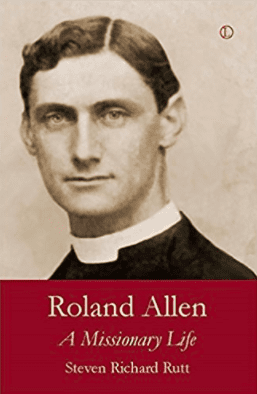 Roland Allen, and it’s too bad more don’t know about him. He anticipated the “mission of God” (missio Dei) theology, he fought hard for indigenous, local, and culturally-shaped local churches, and he continually pushed against missionary societies and denominations having too much control of what was happening on the mission field. Preach the gospel, form churches, move on … that was the vision of Roland Allen.
Roland Allen, and it’s too bad more don’t know about him. He anticipated the “mission of God” (missio Dei) theology, he fought hard for indigenous, local, and culturally-shaped local churches, and he continually pushed against missionary societies and denominations having too much control of what was happening on the mission field. Preach the gospel, form churches, move on … that was the vision of Roland Allen.
Steven Richard Rutt did his PhD at Lancaster on Allen and has turned that research into two very readable and pastorally valuable books: Roland Allen: A Missionary Life and Roland Allen: A Theology of Mission.
The first one is more of a life with his theology of mission woven into it while the second one is a more intense study of his missiology, and the second one ought to be required reading for all missiology students.
Big idea: he got to China, saw how Anglican missions were (not) working and said, “Let’s go back to Paul’s theology of mission and rethink what we are doing.” When I was a college student and wandered more than once a week through the offerings at The Bookstore at Eerdmans, I saw scads of Roland Allen’s classic books, bought the three standard books, and read them. They have long since passed off my desk, but after reading Rutt it makes me want to read them again (Missionary Methods, for instance).
Today’s post, however, is not a comprehensive sketch of Allen’s ideas or Rutt’s fine (and I mean very fine) study. Rather, I want to dig into one theme: Spirit and Mission. Recently I read a book about the work of Wesley and Whitefield that had tons about the Spirit’s work in their theology, practices and preaching… so I build on that (Bruce Hindmarsh) by examining Allen’s emphasis on the Holy Spirit, what Rutt calls his “charismatic missiology.”
His “missio Dei” is as much “missio Spiritus” as it is “missio Christi,” thus anticipating where missiology is today and where the missional movement is today:
‘Missionary zeal is grounded in the nature and & character of the Holy Ghost. . . [and] the Holy Spirit is a missionary Spirit . . . which labours for the salvation of the world’.
Rather he consistently sought to root his understanding of mission in a particular view of the missio Dei.
Again, so central is it to his thought that he, as Brian Stanley puts it, ‘anticipates the emphasis of modern theologies of mission on the missio Dei . . . which is now given to the Holy Spirit in Christian theology and in the churches of the majority world, so many of which are Pentecostal in emphasis’.
Rutt focuses on his book Missionary Methods with the following themes:
1
In the first chapter, entitled ‘The Impulse’, he describes various biblical commandments which lean towards ‘external form’ where the ‘word’ or letter of the law ‘is the standard’, and then he distinguishes this from the ‘internal life’ or spiritual awakening that happens wherein ‘the Spirit is the standard’. He is not promoting an antinomian theology here, but rather developing a pneumatology for which ‘obedience to the commands of the Gospel is a spiritual act’. This spiritual act, he argues, is natural to the missio Dei.
2
In his second chapter, entitled ‘The Hope’, Allen ties together how this compelling ‘missionary zeal’ is internally energized because of ‘the presence of Christ in the soul.’
Next he emphasizes how this revelation of Christ is expressed in three ways: 1) through ‘the conversion of individuals, in the influence of Christ over the lives of individual men and women’; (2) through the ‘progress of the Church’ and the wisdom of God in ‘bringing to us new conceptions of the manifold working of the Spirit of Christ’; and (3) through the Church’s establishment throughout the world ‘we see, too, the leavening of society’ where ‘society is more and more influenced by Christian ideals and principles’.
He knows the temptation in his day that became the social gospel and what today has captured so many in liberation theology, the temptation for mission to be equated with social justice activism apart from evangelism and church.
Allen’s broadly evangelical roots become apparent as he distinguishes between (a) the revelation of Christ to individuals who then are incorporated into the Church and (b) those who are mainly concerned with Christianizing the world through the dissemination of a ‘social gospel’.
Any missionary focus that gave precedence to social issues which ‘overlay the Gospel instead of preaching Christ’ Allen believed was a misplaced focus. His sermons thoroughly focus on the person and work of the crucified and risen Christ. He goes on to clarify what things are of first importance within mission preaching. The Gospel of Christ is contrasted with social betterment through Christianizing and he prefers the preaching of the Gospel of Christ over social reform.
In light of how the missio Dei engages with the care of the whole person, his pneumatology necessitates and reinforces holistic mission that stems from an ecclesiocentric understanding. And. this missionary ecclesiology was nourished by a sacramental belief and practice.
3
In the third chapter, entitled ‘The Means’, Allen logically surmises that if the goal or end’ of mission is ‘spiritual’ then the ‘means also must be spiritual’.
[Quoting Allen, here emphasizing missio Christi] Christ is the source, the end, the worker. … All that we can do is to bring to Christ surrendered wills and hearts and minds to cooperate with Him. He is the only source of spiritual power. Missionary life begins with an act of reception; missionary zeal grows upon knowledge of the Spirit so received; missionary work is the expression of that Spirit in activity.
Christ works through the material, so incarnation is foundational to mission for Roland Allen:
‘The power of making material things into the vehicles of spiritual force’ is accomplished sacramentally. … There is a strong emphasis on Jesus’ incarnation. This provides the sacramental basis for Christianity, because it indicates that ‘matter’ does matter to God. … Therefore, ‘the missionary spirit which Christ brings into our souls’ takes a hold of all material items, such as, ‘money bricks . . . mortar . . . paper . . . ink . . . and gives to them a new character, a spiritual character, and makes them the instruments of spiritual force’.
4
Finally… church expansion through the spontaneous work of the Spirit:
The ‘key of the apostolic work’, according to Allen’s analysis of Acts, was the ‘administration of the Spirit’. This, he contends, explains the following: (l) the apostles preaching the reality of the ‘remission of sins’; (2) the converts experiencing ‘the assurance of forgiveness’; (3) the Holy Spirit imparting new power for the Church; (4) ‘the certainty of the hope of eternal life’ which anchored the Church to embrace ‘persecution and martyrdom’; (5) the Church’s ‘new sense of the value and dignity’ which produced ‘purity of life’ and the formation of ‘hospitals for the care of the diseased’; and (6) the zeal to bring people to ‘salvation’ by proclaiming ‘the Gospel of Christ throughout the then known world’.
When foreign missionaries successfully plant a church, they are then called to trust the pneumatological dynamic to nurture and sustain what Allen’s missiology inculcates, that being, ‘faith in the Holy Ghost in our converts’ for the Church’s spontaneous growth.















